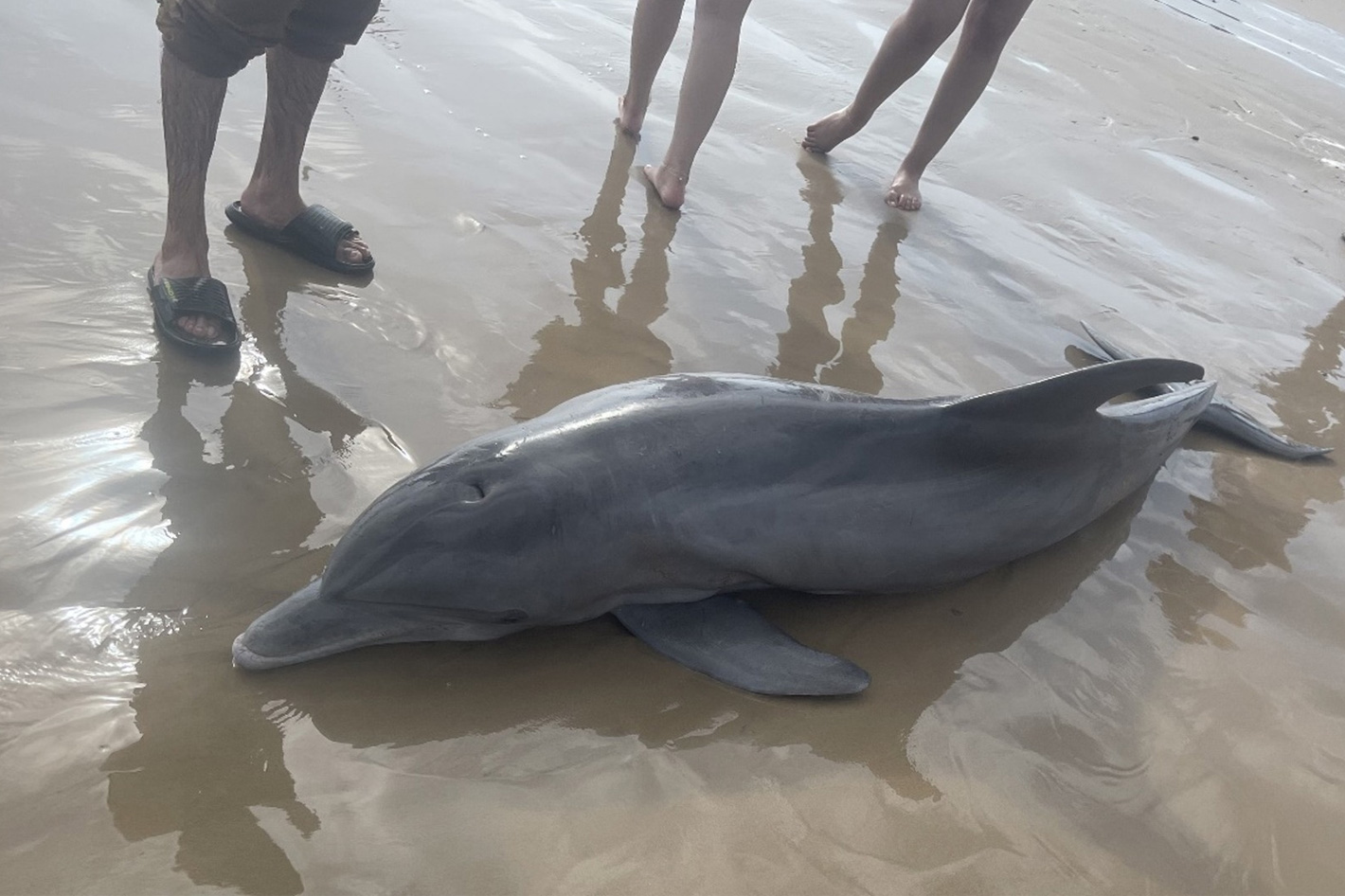A stranded dolphin killed when crowds tried to ride it, another dolphin impaled in the head. NOAA is offering a reward for information that leads to the identification of the persons responsible.
The death of a sick bottlenose dolphin stranded alive last April, at Quintana Beach, Texas is the second case of intentional harm reported recently. According to the Texas Marine Mammal Stranding Network, after the animal stranded alive it was “reportedly pushed back to sea where beachgoers attempted to swim with and ride the sick animal. She ultimately stranded and was further harassed by a crowd of people on the beach where she later died before rescuers could arrive on scene. This type of harassment causes undue stress to wild dolphins, is dangerous for the people who interact with them, and is illegal - punishable by fines and jail time if convicted.”
According to the National Oceanic and Atmospheric Administration, a necropsy of the Texas dolphin, indicated that the dolphin died from drowning. The first case, from Fort Myers Beach, Florida, as National Fisherman reported, revealed another bottlenose dolphin, this one impaled in the head with a spear-like object and apparently died from the wound, according to federal authorities.
“Based on the shape, size and characteristics of the wound, it is suspected that the dolphin was impaled while in a begging position,” according to a statement from the National Marine Fisheries Service Southeast regional office in St. Petersburg, Fla.
The National Oceanic and Atmospheric Administration’s Bureau of Law Enforcement appealed to the public for any information about the animal, reported on the beach March 24 and recovered by the Florida Fish and Wildlife Conservation Commission.
Now, regarding the Texas report, NOAA’s Office of Law Enforcement is asking the public for any information and is offering a reward of up to $20,000 for information leading to one or all of the following:
- Successful identification
- Successful prosecution for the person(s) responsible
- An arrest, conviction, or civil penalty assessment
Harassing, harming, killing or feeding wild dolphins is prohibited under the federal Marine Mammal Protection Act. Violators can be prosecuted with both civil or criminal charges, which are punishable by up to $100,000 in fines and up to 1 year in prison for each violation.
As National Fisherman reported before, NMFS officials say violent incidents involving dolphins in the Gulf of Mexico are a continuing problem for the protected species. The Fort Myers Beach incident is at least the 27th case since 2002 when dolphins have been found stranded with evidence of gunshot or arrow wounds, or stabbed with sharp objects. The dolphin that died at Quintana Beach, Texas, is another sad case to report.
Fortunately, not everything is bad when it comes to stranded marine mammals. The Texas Marine Mammal Stranding Network recently reported a case of a live dolphin stranding event in Galveston, Texas, where in contrast, beachgoers did everything right. The organization says that “a woman found a newborn bottlenose dolphin calf, estimated at just 24-48 hours of age, stranded alone in the surf. She immediately called the Texas Marine Mammal Stranding Network (1-800-9-MAMMAL, 1-800-962-6625) to dispatch a rescue team and get guidance on how to help the dolphin.”
The report notes that “although this dolphin was a very fragile age and ultimately died on the beach, she was as comfortable as possible, without unnecessary stressors, during her final hours thanks to the woman who found her.”
Unfortunately, according to a report from 2016, “the panhandle region of the Gulf of Mexico is known by scientists, regulatory agencies and conservation organizations as a ‘hotbed’ area of dolphin harassment”. The article from “Frontiers in Marine Science” notes that “interactions between humans and wild dolphins routinely occur through close vessel approaches or through direct contact associated with commercial or recreational fisheries, swim-with, or feeding activities.”
The article adds that “bottlenose dolphin stranding data maintained by the National Oceanic and Atmospheric Administration (NOAA) show an apparent increase in the number of dolphins stranding dead with evidence of a gunshot wound in the northern Gulf of Mexico. From 2003 to 2016, at least 20 dolphins have stranded with gunshot wounds, with 65% of those occurring since 2011” and notes “three cases of fishermen shooting at dolphins”.
“In several instances” the article reveals, “fishermen reportedly became irritated at dolphins trying to take bait and catch from fishing lines or trawl nets and shot or threw pipe bombs at the dolphins to keep them away from their gear and/or catch.
NOAA has a special page to report a stranded or injured marine animal. The organization says that “reporting a sick, injured, entangled, stranded, or dead animal is the best way to make sure professional responders and scientists know about it and can take appropriate action. Numerous organizations around the country are trained and ready to respond. If you see a sick, injured, stranded, or dead marine mammal or sea turtle, immediately contact your local stranding network."







